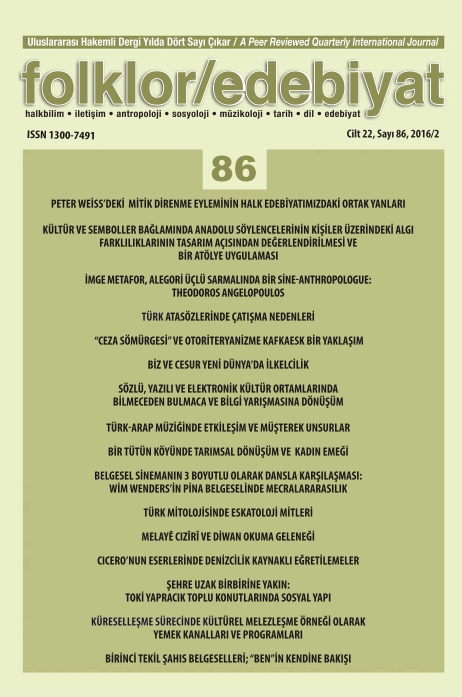Peter Weiss’deki Mitik Direnme Eyleminin Halk Edebiyat Imizdaki Ortak Yanlari
Reflections of our Folk Literature and Folk Culture of Peter Weiss’s Mythological Anti-despotism and Quest
Author(s): Metin KaradağSubject(s): Aesthetics, Social Philosophy, Novel, Turkish Literature, Cultural Anthropology / Ethnology
Published by: Uluslararası Kıbrıs Üniversitesi
Keywords: Peter Weiss; Aesthetics of Resistance; resistance of folk literature; contumacy;
Summary/Abstract: Peter Weis’s Aesthetics of Resistance, a well-known novel in the world literature, is initiated with the figure of the Heracles in Greek mythology to explain the European’s anti-despotism and quest for freedom. Uprising to the divinity and the power of infinite and fighting against the slavery are the first steps to achieve freedom. During the mythical periods, extraordinary authority never allowed the sharing of power and freedom within its hegemony. The desire to protect and sustain its absolute power has led to violence among the lower class. Oppressed masses faced with extreme oppression and violence have created their own heroes to open a path of emancipation throughout the flow of history. Weiss’s novel includes the theoretical fictional narrative which is focused on this particular socio-political context. Weiss also depicts the political and historical analyses of fascism from Ancient Greece to the Spanish Civil War and to Italian and German fascism by unveiling the historical layers of socialist thought in Europe. This novel, with its structure, is considered to be an epic masterpiece of people who rebelled against violence and repression in Europe. Although important variations among individual features, differences in the social structure, and historical conditions are reflected, we also see various considerations and examples of the struggles against exploitation and despotism in nomadic culture that are depicted in Turkish Folk Literature. Since the beginning of world literature, there have been effective works that transfer the resistance against violence, repression, and noble actions. Peter Weis’s Aesthetics of Resistance encompasses the fictional narrative based on the socio-political aspects of these propositions in the whole Europe. Examining the narrative of Turkish folk literature and folk culture, we can see many different reflections and examples of the struggles against the exploitation and despotism in the nomadic culture. This study will focus on the overlapping aspects of these two different literary genres.
Journal: Folklor/Edebiyat
- Issue Year: 22/2016
- Issue No: 86
- Page Range: 9-28
- Page Count: 20
- Language: Turkish

